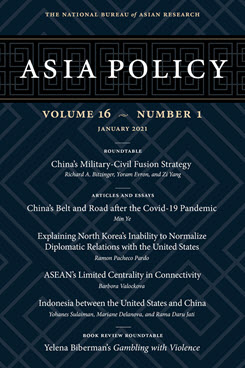Indonesia between the United States and China in a Post-Covid-19 World Order
This essay examines the changing relationship between the U.S. and China, the impacts of the Covid-19 pandemic on both their relationship and each country’s external influence, and the implications for Southeast Asia, particularly Indonesia.
EXECUTIVE SUMMARY
MAIN ARGUMENT
The tension between the U.S. and China had already begun to rise before the Covid-19 pandemic, as China has been challenging U.S. global leadership for some time. But the pandemic has worsened this rivalry by reducing trust between the two powers. The U.S. has blamed China for what it sees as Beijing’s mishandling of the pandemic’s outbreak, and the new Biden administration is likely to maintain a hostile policy. China, on the other hand, will keep deflecting such accusations because accepting the blame will set back its ambition to be global leader and undermine the legitimacy of the Chinese Communist Party domestically. The pandemic has already cost China dearly, as states now see the country as less trustworthy. The post-Covid-19 world will be one that is far more dangerous and conflict-prone due to this lack of trust between great powers and between states in general. The adverse impacts will be strongly felt by Southeast Asia, and especially Indonesia, whose leadership in ASEAN could be eroded.
POLICY IMPLICATIONS
- With rising tension between the U.S. and China, both countries will try to pull Southeast Asian states into their orbits.
- In the case of China, its ham-fisted policies in the South China Sea will prevent the country from rallying Southeast Asian states fully to its side.
- Given the strategic importance of Southeast Asia in the Sino-U.S. rivalry, the U.S. needs to prioritize rebuilding its relationships with regional states that were neglected by the Trump administration.
- Indonesia has a difficult role to play in balancing the interests of both the U.S. and China while maintaining its informal leadership of ASEAN. Therefore, it needs to leverage its position within ASEAN to craft a common policy to achieve its national foreign policy objectives, notably maintaining regional stability, especially in the South China Sea.
Yohanes Sulaiman is a Lecturer in International Relations at Universitas Jendral Achmad Yani in Cimahi (Indonesia). His interests include Indonesian strategic culture and diplomatic history as well as East and Southeast Asian security and politics.
Mariane Delanov is a Lecturer in International Relations at Universitas Jendral Achmad Yani in Cimahi (Indonesia). Her interests include political economy, economic diplomacy, and development issues.
Rama Daru Jati is an undergraduate student in International Relations at Universitas Jendral Achmad Yani in Cimahi (Indonesia). His interests include political economy in East and Southeast Asia.
About Asia Policy
Asia Policy is a peer-reviewed scholarly journal presenting policy-relevant academic research on the Asia-Pacific that draws clear and concise conclusions useful to today’s policymakers. Asia Policy is published quarterly in January, April, July, and October and accepts submissions on a rolling basis. Learn more


